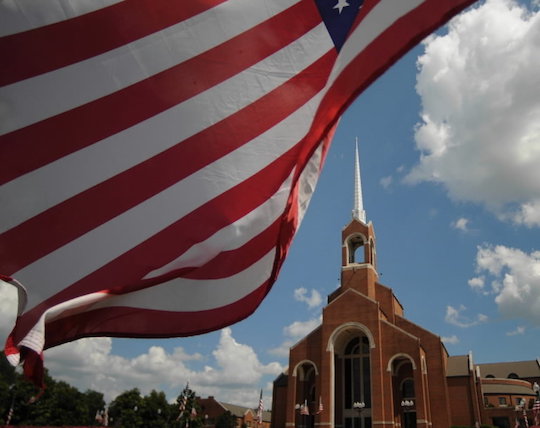When we think about the separation of church and state, we tend to worry about government becoming more like church. But maybe the real danger lies in churches becoming more like governments—by getting a piece of the state’s monopoly on violence, for instance. Yesterday, the Alabama state senate approved a bill to let Briarwood Presbyterian Church assemble its own police force. Briarwood police would be sworn officers with the same authority to carry firearms, issue citations and place people under arrest as, for example, university police. The difference is that they would be employed by a church. That’s tricky, since as police they would become expressions of state power. I’m using “tricky” here to avoid repeating the exact words of the ACLU of Alabama, whose executive director described the plan as “plainly unconstitutional.”
Let us take a moment to imagine what it must be like to work for the ACLU of Alabama. I bet it’s really thrilling for the first year or so. Then, after a few dozen laws requiring park rangers to minister to raccoons or whatever, you probably get a little tired. Anyway, the question of whether it’s okay to let a Presbyterian megachurch form its own police force probably hinges on Briarwood’s attached K-12 and divinity schools.
In North Carolina v. Yencer, the North Carolina supreme court ruled that the campus police department of Davidson College still had the authority to arrest drunk driver Julie Anne Yencer, even though Davidson is affiliated with the Lutheran church. Yencer had argued that the state’s Campus Police Act violated the establishment clause of the First Amendment by delegating police powers to a religious organization. Although an appeals court agreed, the supreme court overturned its decision on the grounds that Davidson’s mission was not “predominantly religious.”
Virtually every review of Yencer I read suggested that it would have gone differently with a divinity school. This apparent consensus does not bode well for Briarwood, which operates both a seminary and a K-12 school with “Christian” right in the name. The church’s mission statement suggests a similar bent: “For God’s glory, we are committed to equipping Christians to worship God and to reach Birmingham to reach the world for Christ.” I’m no lawyer, but that sounds predominantly religious to me.
Probably, temporal law will not allow Briarwood Presbyterian Church to form its own police force. But what does spiritual law say about it? We think of the question of armed church police as an affront to American values, but it seems to run afoul of biblical values even further. In interviews, spokespeople from Briarwood have cited the Sandy Hook massacre as proof they need to protect themselves. I don’t mean to be flip, but the Jesus of the gospels was threatened a lot more directly than Briarwood, and at no point did he instruct his followers to take up arms.
To what degree is Christian moral philosophy fundamentally incompatible with police? Jesus famously cast the moneylenders out of the temple, which is bad news for Briarwood’s Crown Financial Bible Study group. But he enforced no punishment on the other sinners of this world. That was kind of his thing: he forgave the woman taken in adultery, he forgave Saul of Tarsus, he even forgave the people who crucified him. At no point did he hire armed guards to arrest people—neither to uphold temporal or religious law, nor for his own safety.
Of course, there are a lot of things Jesus did that the Presbyterians don’t, and vice versa. If you’re looking for a contemporary Christian church whose congregants mimic the Jesus of the Bible, you’re going to look long. But this police thing poses another danger more subtle than establishment or hypocrisy. The more Briarwood expands beyond the traditional boundaries of a church—with its school, its radio station, its ballet and soccer club, and now potentially its cops—the more it resembles a temporal institution with a spiritual marketing scheme. Briarwood looks less like a church and more like a municipal government. Its Christianity, in this context, functions as a mere brand.
Ironically, this plan to form a police department might force Briarwood to argue that its mission is not predominantly religious. That would be a tough sell for a church, but after Burwell v. Hobby Lobby I’m ready for anything. Besides, they might have a point. Between the singles groups and the soccer league and the financial advice, how many Briarwood congregants could take or leave the Jesus part? Perhaps the mission of the Christian church in America today is not primarily religious, either.





Make this longer with an additional case or two and sell it to Vox. Solid reporting here.
Also you can link to the Yencer reviews you referenced, and explain “temporal law.” I think you mean that the Yencer precedent won’t allow it, but then what is the Senate voting on? A single sentence explaining you predict the Senate’s allowance will get struck down by a court when challenged by the ACLU would get the job done.
Excellent piece